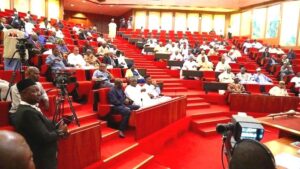The controversial National Transport Commission (NTC) Bill has resurfaced at the Upper Chamber of the National Assembly.
But, the Senate stepped down a motion seeking to amend the National Transport Commission Bill, 2022.

The motion for re-committal of the bill to the Committee of the Whole was sponsored by the Senate Leader, Yahaya Abdullahi(APC-Kebbi) at Wednesday’s plenary.
Presenting the bill, Abdullahi said that it was originally passed by the Senate and the House of Representatives and sent to the President but assent was withheld with observations.
“After critical examination of the observations by the Technical Team of the National Assembly and critical stakeholders, it was imperative to address these observations and make necessary amendments in order to rejig the transportation sector of the economy,” he said.
Sen. James Manager (PDP-Delta) advised his colleagues that the motion for re-committal of the bill be stepped down until when details of the observations raised by the President were made available.
Senate President, Ahmad Lawan, who shared Manager’s view said: “The areas observed by the President on the bill should have been highlighted because not all of us were there.
“It is appropriate that we stand down consideration of this report until those areas of concern are made available to Senators in the lead debate, because that will help us make informed judgment on how we treat and process this bill.”
Manager, thereafter, moved a motion for the amendment of the bill by the Committee of the Whole to be stepped down.
The motion was seconded by Sen. Ibrahim Gobir (APC-Sokoto) and was unanimously adopted by the senators.
Shipping Position Daily recalls that, in late 2018, the President had declined to assent to the National Transport Commission (NTC) Bill (which the Senate had passed in March 2018). The president cited the need to review certain fiscal provisions set out in the bill, as well as concerns over the duplication of functions which already fell within the statutory mandates of the Nigerian Maritime Administration and Safety Agency and the Nigerian Ports Authority.
Read Also: Smuggling: Customs to deploy 135 scanners at ports, land borders
The NTC Bill seeks to establish the National Transport Commission as an economic regulator of all activities undertaken in Nigeria’s transport sector. The NTC, which is set to replace the Nigerian Shippers’ Council, would operate as an independent regulator to promote multimodal transport and boost private sector participation in the provision of transport services. Among other things, the NTC would be responsible for creating equitable access to transport services; and regulating the tariffs, rates and charges paid by transport service users.
President Muhammadu Buhari had refused to assent the NTC Bill on three grounds including the removal of safety issues because the bill is purely economic regulations.
Secondly, the President also said that the royalty to be paid to the commission as source of funds which was pegged at 10 percent should be reduced to five percent.
Thirdly, Buhari also asked the National Assembly to look at the freight stabilisation fee, which was put at three percent to be reduced to one percent just like it is in the Nigerian Shippers Council (NSC) Act.
Kindly like us on Facebook
















Discussion about this post